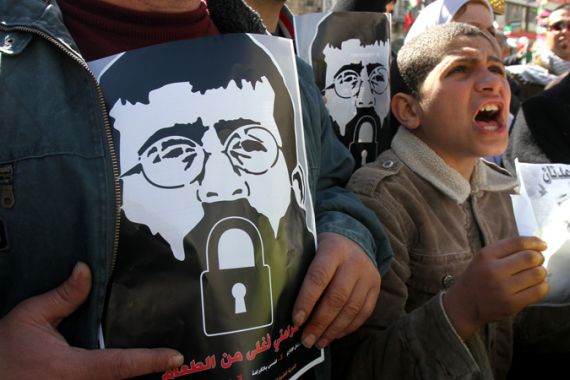US must seize opportunity to support Palestinian non-violence
The United States should seize the opportunity as push for peace while Palestinians increasingly embrace non-violence.

Washington, DC – Khader Adnan spent 66 days on hunger strike, a symbolic, self-denying act of non-violent resistance to Israel’s practice of “administrative detention” or imprisonment without charge. His story quickly became well known and began to inspire other Palestinian political prisoners to follow his non-violent lead.
But Adnan’s is merely the latest episode in a growing wave of Palestinian non-violent resistance. While Palestinian non-violence has been a historic part of the struggle for Palestinian rights, armed struggle has been a component of resistance that often dominated the headlines.
Today things are changing significantly. More than ever, polling data shows, Palestinians are supporting non-violent resistance. A series of polls of Palestinians in the West Bank and Gaza which included a question on non-violence reveals an undeniable trend in the past 18 months. In June of 2010, for example 51 per cent of Palestinians polled responded that non-violent resistance was a preferred alternative to stalled negotiations. In the most recent poll conducted at the end of 2011, that number jumped to over 61 per cent.
|
|
| Palestinian prisoner ends hunger strike |
There are several factors that contribute to this undeniable shift.
First, there is a continued call by Palestinian and international civil society for non-violent resistance. Advocacy and solidarity along these lines has reverberated through Palestine and internationally thanks to the internet and social media. It took several days of the twitter hashtag #KhaderAdnan trending globally before international mainstream media took note, forcing the Israelis to address what had become an embarrassing situation by cutting a deal with the hunger striker.
Second, we can not discount the effect of the Arab Spring and especially the success of revolutions in Tunis and Egypt where people power triumphed over repressive regimes and relatively light force was used before the multitudes brought swift change upon the regimes.
Third, and perhaps most importantly, Palestinians have seen firsthand the difference in effect non-violent resistance and armed resistance has on them and the Israelis. Armed resistance to the occupation, while encouraged and supported by some and protected by international law, can come at a high cost.
The Israelis are well armed with F-16s, tanks, Apache helicopters, drones, laser guided missiles, and armed robots (most courtesy of the US). But the killing of several civilian non-violent activists aboard the Freedom Flotilla, the shooting of several unarmed demonstrators in the Golan, Lebanon and Gaza at events commemorating Nakba Day last year, and the routine arrest, beatings and often killings of non-violent protesters in the occupied territories has proven the old adage, “when all you have is a hammer, everything looks like a nail”.
This sentiment was reflected by Major Amos Gilad, an Israeli military official, to American diplomats in a WikiLeaks cable last year when he confessed “we don’t do Gandhi very well”.
Non-violent resistance is like Judo – the Japanese martial art based on using an enemy’s strength and momentum against him – and the Palestinians find themselves facing a 300 kg Sumo wrestler. It is a strategic choice to resist the occupation.
Increasingly, Palestinians are realising the effectiveness of this strategy. Large swaths of the Palestinian public are in support of these non-violent methods today, but for how long?
For years, many asked where the Palestinian Gandhi is. Well, today, you are starting to hear about the ones imprisoned or shot because the internet has levelled the information battlefield.
Fadi Quran, a non-violent protester who was forcefully arrested this week under false pretenses, was released on bail by the Israelis after a YouTube video of his arrest – rifled around the world through Twitter – was published. It showed Fadi was pepper sprayed and forcefully arrested by Israeli officers for no crime at all. Had this happened 10 years ago, Fadi might still be in an “administrative detention” and we would have never have heard of him.
|
“Silence in the face of injustice is complicity with the oppressor.“ – Dr Martin Luther King, Jr |
In nearly each and every high profile act of Palestinian non-violent resistance the official Israeli response has been demonisation of the protesters while the American response, more often than not, has been silence.
As the great Dr Martin Luther King taught us, “silence in the face of injustice is complicity with the oppressor”.
Today, however, the cost of remaining silent for the United States is not merely complicity with the oppressor, but also missing a critical opportunity. This is a moment when Palestinians are increasingly choosing non-violent resistance, a point President Obama highlighted in his important Cairo speech in 2009, and the United States should support this effort.
The window, however, to grow Palestinian support of non-violence may close as quickly as it opened if continued Israeli repression is not condemned forcefully by Israel’s principal ally. Should the US continue to support repressive and colonialist Israeli policies, the pendulum of public opinion may soon swing back to armed resistance as another generation of Palestinians grows up dreaming of freedom from occupation.
Yousef Munayyer is Executive Director of the Palestine Center in Washington, DC.
